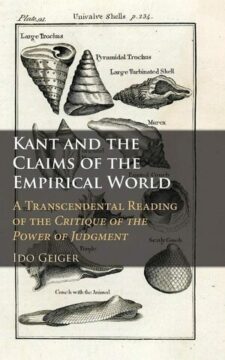Nick Stang at Notre Dame Philosophical Reviews:
 Readers of Kant’s third Critique, the Critique of the Power of Judgment, are presented with a set of puzzles about the unity, indeed, the very existence, of the very book before them: why did Kant think his critical system was ‘incomplete’ without a critique of the power of judgment, and why would such a critique complete that system? Why must that critique contain a critique of aesthetic judgment and a critique of teleological judgment? Are each equally necessary to the critical project? To borrow a trope from Kant himself, is this book a mere aggregate of its parts, or is it unified by an idea of the whole that determines those parts? And if so, what is that idea, and does it determine that the third Critique must have these, and only these, parts (no more, no fewer)?
Readers of Kant’s third Critique, the Critique of the Power of Judgment, are presented with a set of puzzles about the unity, indeed, the very existence, of the very book before them: why did Kant think his critical system was ‘incomplete’ without a critique of the power of judgment, and why would such a critique complete that system? Why must that critique contain a critique of aesthetic judgment and a critique of teleological judgment? Are each equally necessary to the critical project? To borrow a trope from Kant himself, is this book a mere aggregate of its parts, or is it unified by an idea of the whole that determines those parts? And if so, what is that idea, and does it determine that the third Critique must have these, and only these, parts (no more, no fewer)?
Ido Geiger’s excellent new book, Kant and the Claims of the Empirical World: a Transcendental Reading of the Critique of the Power of Judgment, offers a bold new take on some of these foundational issues about the unity and structure of the third Critique. Geiger’s leading thread is that the CPJ continues the project, begun in the Critique of Pure Reason (CPR), of uncovering transcendental conditions for the possibility of experience.
more here.
Enjoying the content on 3QD? Help keep us going by donating now.
